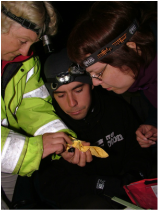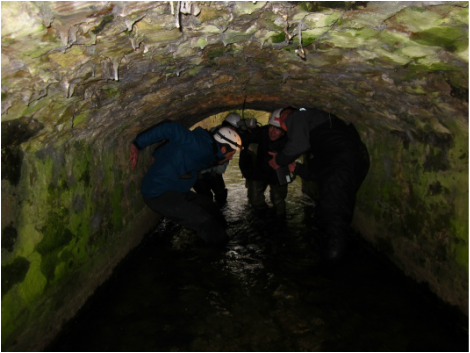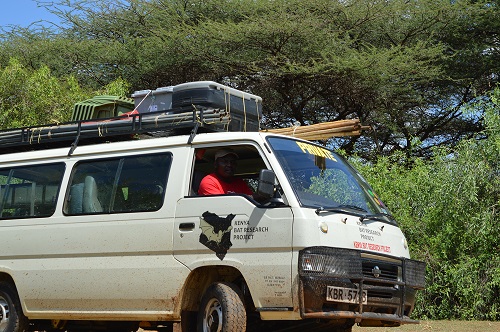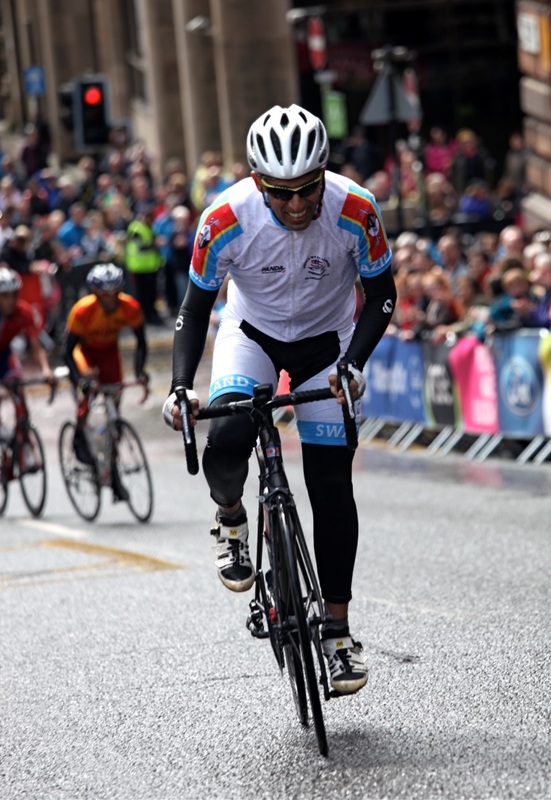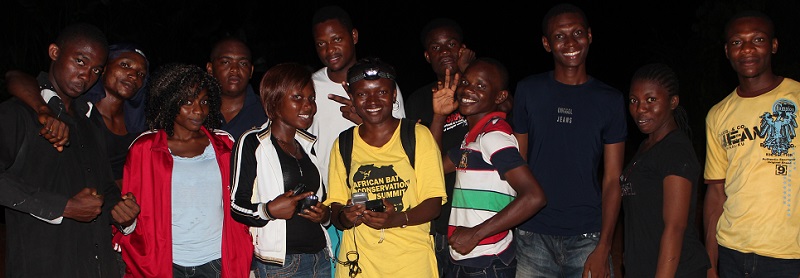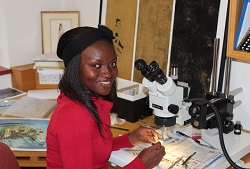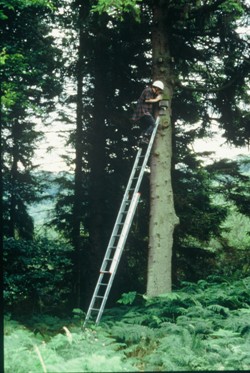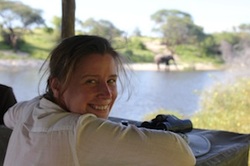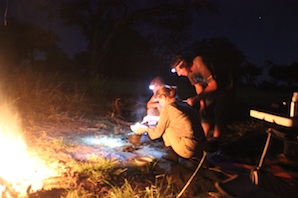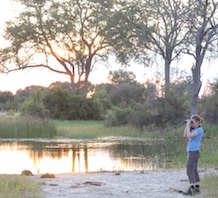Meet the Scientist
In this series we will be introducing you to Scientists (and other professionals) working on bat research and/or conservation in Africa and around the world. Our 'Meet the Scientist' feature started in March 2014 to coincided with International Women's Day - promoting gender equality, so it seemed only fitting that we started the series with two inspiring women who are at the forefront of bat conservation and will continue to introduce passionate and inspiring men and women studying and conserving bats around the world.
February 2016
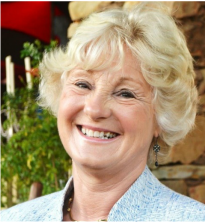
Sandie Sowler
I’m Dr Sandie Sowler, an ecologist and ecological trainer and ecological consultant. I'm passionate about African bat conservation and have been volunteering for Bats without Borders as an Advisory Board Member since the charity started in August 2013.
I’m Dr Sandie Sowler, an ecologist and ecological trainer and ecological consultant. I'm passionate about African bat conservation and have been volunteering for Bats without Borders as an Advisory Board Member since the charity started in August 2013.
|
Who inspires you?
What do you do in you downtime to relax?
|
My old PhD supervisor Dr John Hanks who originally inspired me and continues to do so. He is a well known African environmentalist who was involved in the early days of Trans Frontier Parks and continues to be involved in environmental education in South Africa.
My husband and I travel abroad as much as possible to see natural landscapes, biomes and species. We also dance Ceroc, a form of modern jive, cycle and I also drive horses.
|
May 2015
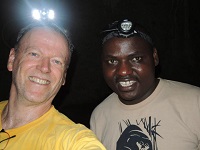
Paul Webala
I am a lecturer and current Head, Department of Natural Resources, Karatina University, Kenya. Using bats as model species, my focus currently interrogates processes that drive rarity and abundance of mammals in natural environments. I am also involved in describing bats of Kenya, including developing a call library of insectivorous bats that will underpin future ecological studies of this important faunal group.
I am a lecturer and current Head, Department of Natural Resources, Karatina University, Kenya. Using bats as model species, my focus currently interrogates processes that drive rarity and abundance of mammals in natural environments. I am also involved in describing bats of Kenya, including developing a call library of insectivorous bats that will underpin future ecological studies of this important faunal group.
|
What motivated you to work in science / ecology?
What do you enjoy most about working in science / ecology?
Who inspires you?
What are the main challenges we face in conservation / bat conservation?
What advice do you have for other budding scientists / ecologists?
What obstacles have you found in your career?
|
I grew up on my father's large farm in western Kenya, and I was just fascinated (primarily) by the cheekiness of vervet monkeys and stripped ground squirrels that were a menace in feeding on and destroying our maize crop. I really had a passion to study (the behaviour of) non-human primates from my teenage years
I
really enjoy fieldwork in remote areas, away from the hustle and bustle of city
life but importantly I marvel at seeing and discovering new things.
I look up to many scientists, but my two biggest inspirations are Paul Racey and Bruce Patterson, who mentored me and continue to inspire many a young scientist from around the world with their mentorship, resilience, focus and determination. The two scientists have shown me that nothing is impossible.
In our part of the world two challenges stand out. 1) Ignorance about bats, even in academia; and 2) Inordinate focus and interest in so-called charismatic megafauana. These challenges are surmountable with more capacity building and training, and through a sustained public education and community outreach programme.
A successful scientist should first learn how to handle and accept failure.
From a developing country perspective, funding is a major obstacle, and this means inadequate facilities, resources and equipment for research.
|
January 2015
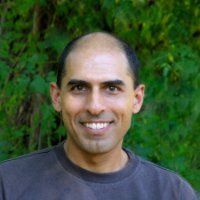
Ara Monadjem
I am a zoologist specialising in the ecology and conservation of the birds and mammals of Africa. My focus is currently on African small mammals (specifically bats and rodents), and large birds (vultures, eagles and storks). I specialize in field surveys where the objectives are primarily to obtain distributional information on rare and threatened species, and to provide accurate identifications of these species. I am also involved in predictive modelling of distributions, and studies of population dynamics.
I am a zoologist specialising in the ecology and conservation of the birds and mammals of Africa. My focus is currently on African small mammals (specifically bats and rodents), and large birds (vultures, eagles and storks). I specialize in field surveys where the objectives are primarily to obtain distributional information on rare and threatened species, and to provide accurate identifications of these species. I am also involved in predictive modelling of distributions, and studies of population dynamics.
|
What motivated you to work in science / ecology?
What do you enjoy most about working in science / ecology?
What do you do in a typical day?
What advice do you have for other budding scientists / ecologists?
What obstacles have you found in your career?
Who inspires you?
|
It was a childhood passion. I was interested in animals from the very beginning.
I love the aspect of being able to discover new things and see old things in a new light. I love the atmosphere of constant change. It makes it exciting.
I get up before 5am and cycle for 90 min, then go to my office at the University of Swaziland where I will prepare and give a couple of lectures or labs, attend meetings, and/or mark tests/exams. On good days, I’ll get to work on a manuscript. I go home in the early evening around 6pm and then read and relax before bed.
Follow your passion and do not be put off by obstacles in your way. Persevere and you will not be disappointed.
Funding is the eternal nightmare of all scientists. Working in Swaziland also presents the challenge of working in an academic vacuum. Science is not very big in Swaziland, not even amongst scientists.
I’ve been inspired by many scientists, especially those that have taken time to share their enthusiasm and knowledge with their colleagues, the broader public and the next generation.
As well as having a hectic academic career Ara is also an avid cyclist and represented Swaziland in the 2014 Commonwealth Games held in Glasgow, Scotland. As I'm sure you will all agree representing your country is a huge achievement for anyone but even more so for Ara who suffered a major leg injury during mountain biking race in 2009 and had a four year break from cycling.
In an interview about the event Ara said: A year ago I had just started cycling after a 4 year break, thanks to a major knee injury during the Frontier (2009). Before the accident, I was a competitive mountain biker, but after it I could only handle road cycling. And very slow road cycling! In the 2013 Mafutseni race, I finished nearly last in the 100 km event. A year later, I was in the sprint finish with the winners. In the interim, I had changed not only my bike but also my mindset. I was determined to race again, so I “rolled up my sleeves” and got down to work, starting serious training in January 2014. I cancelled all unnecessary trips (and even some necessary ones!), so that I could focus on training. By April/May, I was living, eating and sleeping cycling. I was regularly up at 3 am to get in 2-3 hours of cycling before work. I rode every weekend, usually on both days. I clawed my way back to a decent level of fitness. And then I was selected to go to Glasgow! Very well done Ara!!! |
May 2014
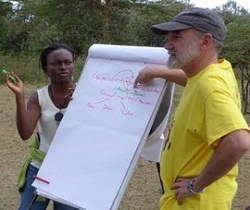 copyright BCA
copyright BCA
Iroro Tanshi
I am an enthusiastic field biologist interested in species distribution patterns, community and landscape ecology. I hold a BSc in Environmental Science from the University of Benin and a Masters in Biodiversity Conservation, University of Leeds. I study bats asking interesting questions about their distribution in Nigeria as well as roost choice in cave dwelling bats. I hope that such questions will provide information to guide conservation actions targeted at cave dwelling species.
Iroro at the Bat Conservation (BCA) launch in Kenya (Feb 2013) with Prof Rodrigo Medellin
I am an enthusiastic field biologist interested in species distribution patterns, community and landscape ecology. I hold a BSc in Environmental Science from the University of Benin and a Masters in Biodiversity Conservation, University of Leeds. I study bats asking interesting questions about their distribution in Nigeria as well as roost choice in cave dwelling bats. I hope that such questions will provide information to guide conservation actions targeted at cave dwelling species.
Iroro at the Bat Conservation (BCA) launch in Kenya (Feb 2013) with Prof Rodrigo Medellin
|
What motivated you to work in science / ecology?
|
In general my interest in science was inspired by my father’s unending stories of the problem solving approach by scientists. So growing up, I always knew that I wanted to be a scientist. However, my interest in ecology began in final year of my undergraduate studies when I volunteered to do field work with two plant ecologists Dr Emmanuel Aigbokhan and Mrs Oyomoare Osazuwa-Peters, both faculty members at the University of Benin. My interest in ecology was further developed after attending the Tropical Biology Association course in Kibale National Park, Uganda. It was also during this short course that I listened to an interesting lecture on West African bat-pollination networks. This talk was truly inspiring and got me thinking about bats. In addition to this talk, the gaps in knowledge and conservation initiatives on Nigerian (as well as most of Africa) bats relative to the rest of the world, spurred my current interest to study bats.
|
|
What do you enjoy most about working in science / ecology?
|
I’m very pleased that I can contribute information about such under studied animals, more so in Nigeria and most of Africa where they are ignored and hated mostly for due to cultural believes and misinformation. Science/ecology allows me to work in teams which provides the opportunity to learn new ideas and ways of working effectively with other people, I find this very interesting. I guess one of the most exciting thing about ecology is the idea of being in wild areas, which for a bat ecologist is both day and night. Preparing capture plots in the day time allows me take in the view in the landscape, while night time bat capturing is exciting because I get up close with my favourite animals. In addition, studying bats has allowed me to travel quite a lot in such a short time, either for field work or scientific meetings and conferences allowing me to meet exciting new contacts, which I find very enjoyable.
|
|
What do you do in a typical day?
|
On a typical weekday, I would interact with students as part of my Assistant Lecturer position at the University of Benin, Benin City, which in addition to grading and tutoring them on practical subjects, inspire them to get involved in conservation research or initiatives. Other very important activities include replying to emails for Bat Conservation Africa (BCA), where I currently serve on the steering Committee, facilitating discussions on a subject or driving BCA plans and initiatives. I pretty much live a workaholic life on weekdays, so my evenings are filled with pending tasks from the day and planning for the next. Weekends are a bit more relax, but will see me counting bats in the company of our student volunteers on the Eidolon Monitoring Network at a huge bat colony in Benin City center. This is usually preceded by laundry and followed by stocking up food supplies for the week and working out at the University Sports centre.
|
|
Do you have any interesting stories from the field?
|
Yes, I have stories ranging from weird to revealing. One of my absolute pleasures is having to explain to my local field assistants that fruit bats caught in my nets are not for consumption, they never seem to get the point and all though they have always respected my position so far, I think they hate me for it. Other exciting times include me (with photos) drinking from the cut branch of a liana in the rainforest and one of me on a ladder resting on a tree, attempting to fix the rope system for our canopy net. I’m yet to be chased by a lion (eastern Nigeria) or ambushed by a buffalo in Okomu National Park though.
|
|
What advice do you have for other budding scientists / ecologists, in particular women?
|
Take whatever personal development opportunities you come across; volunteering and short courses. I think a fair bit of healthy aggression is required in attracting such opportunities. For budding female scientists in the tropics, don’t listen to the small voice that says you can’t do this. There is a whole life ahead of you waiting to be discovered.
|
|
What are the main challenges we face in conservation / bat conservation?
|
From an African perspective, I think the main challenges to bat conservation include: misinformation among the general public, limited local capacity, library resources and scientific evidence to guide conservation efforts. But I also see these as opportunities to go all out, to educate the public and provide mentorship and support of budding biologists to ensure recruitment into the field. All these in addition to funding.
|
|
What is your favourite animal / bat and why?
|
Lavia frons (Yellow-winged bat). It’s a really pretty bat.
|
March 2014
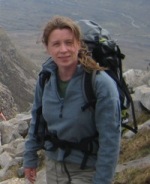
Dr Kirsty Park
I’m a Senior Lecturer working within conservation biology at Stirling University – much of my research focuses on animal ecology in heavily human modified environments (e.g. urban and agricultural landscapes) and I teach a diversity of courses, largely conservation biology but also vertebrate diversity and on an ecology/evolution overseas field course to undergraduate and Masters students.
I’m a Senior Lecturer working within conservation biology at Stirling University – much of my research focuses on animal ecology in heavily human modified environments (e.g. urban and agricultural landscapes) and I teach a diversity of courses, largely conservation biology but also vertebrate diversity and on an ecology/evolution overseas field course to undergraduate and Masters students.
|
What do you enjoy most about working in science / ecology?
|
The variety and the freedom would probably sum it up. When you’re doing your PhD and postdocs you are usually working on somebody else’s ideas, but once you get a lectureship you can develop your own ideas and projects and this is really exciting. I never thought of myself as someone who could head up a research team (I was somewhat terrified when my first PhD student started, it just felt like such a huge responsibility and I didn’t know if I was up to it), but I’ve surprised myself by really enjoying this aspect. I’m lucky in having a great bunch of people to work with, within my research group, the department and also my wider collaborative network – this is something that is very important to me and really critical when you’ve had a knock-back. From a teaching perspective, I love following motivated and enthusiastic undergraduates through their four year course and seeing them do well, especially when they exceed their expectations and start considering careers they previously hadn’t thought about.
|
|
What advice do you have for other budding scientists / ecologists, in particular women?
Kirsty monitoring bat boxes during her undergraduate degree, as part of Professor John Altringham's bat lab group at the University of Leeds (UK).
|
This is a tough one as I’m now undoubtedly going to give advice that I can find difficult to take myself so if you’ll forgive the hypocrisy….
Quite often you’ll hear how you need to “be confident” and “believe in yourself” – this is easier said than done! However, it is true that conveying an impression of confidence can make others more likely to have confidence in you. Try and work on acting confidently if this is something you struggle with – you do still need to know your stuff so make sure you go into meetings / presentations etc as well prepared as you can be, but if you’ve done all you can then act confidently, even if you don’t feel it. Most people do this to some extent – I’ve been amazed to find out when people I know have confessed to feeling nervous and it hasn’t been apparent to me at all. Develop a widespread and supportive network of contacts. I hate the term networking but like it or not it’s vital and it doesn’t have to mean posturing and self promotion – make an effort to talk to people you don’t know at conferences and meetings rather than always hanging about with your friends. If you find it hard to describe succinctly what it is you work on and why it’s interesting you need to work on this beforehand – you can develop a pitch for yourself without making it sound staid and practiced. Force yourself out of your comfort zone every now and then and expose yourself to new ideas by, for example, reading papers and going to talks on subjects tangential or unrelated to your field. Rejection – it’s inevitable… papers will get rejected, grants won’t get funded, jobs will go to someone else. This does not mean you are rubbish. There are some things you can actively do: show your CV, papers, grants to others outside your immediate sphere – can they be improved upon? Do they make sense to people who don’t already know about the subject? However, even if they are great you will still get rejected sometimes and you need to make sure that you don’t allow yourself to wallow in despair for too long. I have heard the suggestion that this might be one contributory factor to the lack of women in more senior positions in academia – that men tend to have more self-belief (whether it’s justified or not!) and find it easier to bounce back from the knocks. I don’t know if this is true or not but it’s clear that if you struggle to believe in yourself then receiving a string of rejections is not going to help in this. So here is where a supportive network is really important, and making sure you have other opportunities. With funding for example it’s important not to rely on just one or two grant awarding bodies for funding – try and develop a range of projects which will enable you to tap into a wide diversity of funding sources. And finally…. make sure you have outside interests that are not related to work and friends who are not all scientists or academics. I lived with a great friend who was a children’s nurse in the first six months of my PhD – it really helps you get a perspective sometimes. |
Photos taken during Kirsty's visit to Botswana helping her PhD student (Rachael) with her fieldwork.
|
How do you think people (general public) can help conservation / bat conservation?
|
There are so many ways – they are fascinating creatures and there are lots of opportunities to find out more about them (e.g. bat walks). Challenge people’s misconceptions where you hear them; do a roost count or field survey for the Bat Conservation Trust’s National Bat Monitoring Programme. The Bats without Borders website also gives you an opportunity for them to earn money while you shop online!
|
|
If you were to be stranded on a desert island what 3 books would you hope you’d packed?
|
Firstly I’d make sure I did the packing myself – far too important to entrust to anyone else. I’m also going to cheat shamelessly here since Kirsty Young is not here to say no…. I’d go for all David Attenborough’s back catalogue as one choice. Then I’d need to have a really good wildlife guidebook to the area – something that included everything from plants to vertebrates. I’d need some fiction with me and something that was going to take me a while so perhaps all of Dickens’ novels as another choice. Then when nobody was looking I’d tuck the SAS survival handbook in my luggage as I’m sure I’d need it.
|
|
Who inspires you?
|
When I was 11 one of the people who really inspired me was David Attenborough (hardly a novel answer I know!), but the programmes he made and the way in which he presented them made a real impression on me. As the years go on I think I’ve taken inspiration from a whole range of people – some male, some female. For a long time I’m not sure I realised the importance of female role models for women in science as it wasn’t something I was conscious of thinking about. However, I’ve come to realise that the lack of women in more senior positions does send a negative message and no doubt did to me as well when I was considering careers (which did not include academia until much later). It’s one of the reasons I love the Radio 4’sThe Life Scientific – very unusually 50% of the scientists interviewed on this programme are women and it really showcases the range of incredible female scientists out there working in a whole range of scientific disciplines.
|

